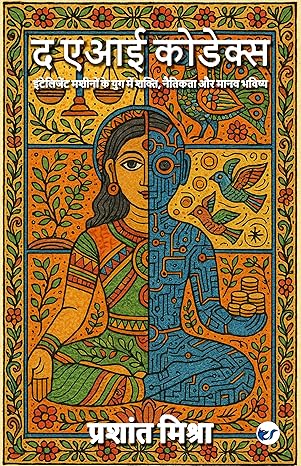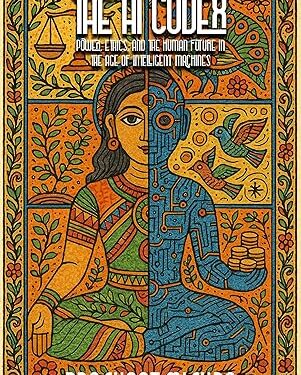
The AI Codex: Power, Ethics, and the Human Future in the Age of Intelligent Machines: In a world increasingly shaped by artificial intelligence, where machines are beginning to reason, learn, and even create, The AI Codex: Power, Ethics, and the Human Future in the Age of Intelligent Machines by Prashant Mishra arrives as both a wake-up call and a roadmap. This book doesn’t just explore AI—it opens a doorway to understanding how AI is rapidly transforming our world and compels us to rethink what it means to be human in this new era.
Mishra, a thought leader and a keen observer of technological evolution, crafts a compelling narrative that blends insight, accessibility, and depth. At a time when AI discussions are often dominated by engineers, coders, or Silicon Valley elite, The AI Codex bridges the gap between the technical and the everyday. It speaks not just to technologists but to students, professionals, artists, thinkers, and anyone curious about the digital future we are stepping into.
AI Without the Jargon: A Guide for All
One of the most remarkable qualities of this book is its accessibility. AI is, by nature, an interdisciplinary and highly technical domain. For many, the conversation around it is intimidating—filled with data models, machine learning algorithms, and robotic theory. Mishra masterfully cuts through that fog. The AI Codex is written in a lucid and engaging style that invites readers in, regardless of their familiarity with technology.
Instead of coding language, the reader is offered compelling insights. Instead of formulas, they’re given reflections on ethics, philosophy, society, and identity. The book shows that understanding AI doesn’t require a degree in computer science—it requires curiosity and a willingness to ask big questions.
More Than Technology: A Mirror to Society
What sets this book apart is that it doesn’t just look at AI as a tool or a technological breakthrough—it examines AI as a social and philosophical phenomenon. Mishra takes the reader on a journey through the impact of AI on nearly every aspect of life: from jobs and workplaces to art, education, culture, and relationships. He examines how AI is disrupting institutions, redefining power structures, and even changing the way we make decisions.
Chapters dive into how AI is shifting economies, creating new forms of inequality, and challenging the boundaries between human and machine. Yet, the tone remains reflective rather than alarmist. Mishra is not predicting doom—he is advocating for awareness. He asks his readers to look beyond convenience and automation, and instead consider what kind of society we are building with AI at its center.
Where Science Fiction Meets Reality
Another compelling layer of The AI Codex is its philosophical depth. Mishra doesn’t just reference the now—he draws on ideas that once lived in the realm of science fiction. He explores how concepts from dystopian novels and futuristic cinema are now shaping public consciousness—and in some cases, becoming real. In doing so, he elevates the book from a guide to a conversation about humanity’s destiny.
By blending cultural references with real-world developments, the book gives AI a human face. Mishra’s skillful balance of futuristic imagination and grounded analysis makes The AI Codex a captivating read, especially for those interested in the moral and existential dimensions of artificial intelligence.
A Call for Ethical AI and Human-Centered Design
Crucially, Mishra doesn’t shy away from discussing the ethical dilemmas that AI presents. Issues of bias, surveillance, job automation, decision-making, and privacy are explored with nuance. He raises questions that societies must urgently answer: Who controls AI? Who is accountable when machines make decisions? How do we build fairness and transparency into algorithms?
The AI Codex encourages readers to become participants in shaping the future of AI—not passive users of technologies we barely understand. It’s a call to action for more inclusive design, transparent governance, and public engagement.
Bilingual Edition: Reaching Diverse Readers
Notably, the book is available in both English and Hindi (“द एआई कोडेक्स: इंटेलिजेंट मशीनों के युग में शक्ति, नैतिकता और मानव भविष्य“), a much-needed step toward bringing critical conversations about AI into non-English-speaking communities. This bilingual offering ensures that a broader audience—especially in India—can engage with these urgent themes.

Final Verdict: Essential Reading for the AI Age
In a crowded field of AI literature, The AI Codex stands out for its clarity, breadth, and ethical grounding. It is not just a book—it is an essential companion for anyone trying to navigate the challenges and opportunities of living in the age of intelligent machines.
Whether you’re a student exploring career paths, a policymaker crafting digital regulations, or simply a curious reader trying to make sense of it all, this book offers valuable insights. Mishra invites us not only to understand AI—but to shape it wisely and ethically.
The AI Codex is not a warning—it’s a compass. And in these uncertain times, we need one more than ever.















